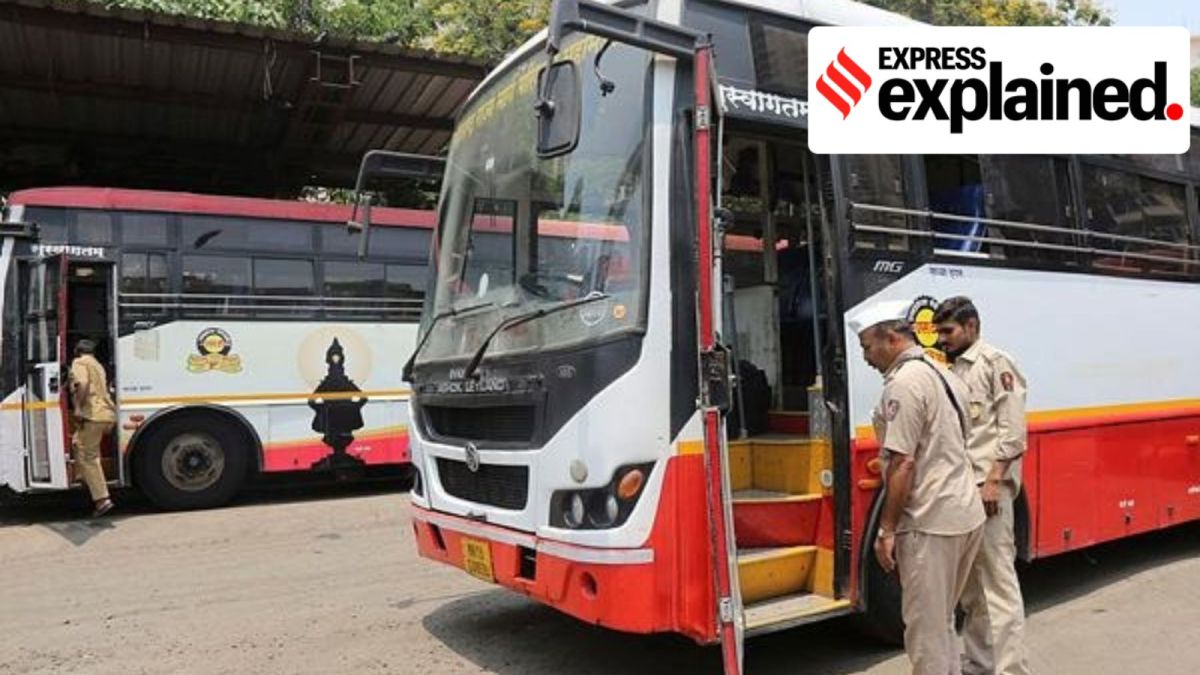Why have Karnataka and Maharashtra stopped bus services to each other’s state?
The trigger was attacks on bus staff in both states. But the border dispute between the two states, fired by subnational pride and linguistic chauvinism, is decades old. Tensions flare up periodically – like they have now

The long-standing Maharashtra-Karnataka border dispute, fanned by linguistic chauvinism on both sides, flared up again this week with incidents of attacks on staff of state-operated buses – ultimately leading to the suspension of services between the two states.
Here’s what happened, and why.
The incidents
On February 21 night, a 51-year-old conductor on a Karnataka State Road Transport Corporation (KSRTC) bus was allegedly assaulted in Marihal, Belagavi, after an argument with a woman passenger who insisted on speaking to him in Marathi. Police arrested four people for the attack, but the conductor was also booked after the woman accused him of misbehaving with her.
Subsequently, the driver of a Maharashtra State Road Transport Corporation (MSRTC) bus was attacked and his face blackened in Hiriyur taluka of Karnataka’s Chitradurga district. Several people were arrested after the incident.
On February 23, a KSRTC bus was vandalised in Maharashtra, and “Jay Maharashtra”, “Marathi”, and “Maharashtra Navnirman Sena” were written on it.
The following day, alleged members of the Shiv Sena (UBT) attacked the driver of a North Western Karnataka Road Transport Corporation (NWKRTC) bus at Saat Rasta in Solapur, smeared saffron colour on his face, and raised pro-Maharashtra slogans.
The reactions
Maharashtra Transport Minister Pratap Sarnaik condemned the attack on the MSRTC driver and announced that bus services from Maharashtra’s Kolhapur division to Karnataka would remain suspended until the Karnataka government took a clear position on the issue and began discussions with Maharashtra.
Karnataka began by restricting operations to Maharashtra as tensions rose, but stopped all KSRTC buses after the incident of February 24. State Transport Minister Ramalinga Reddy posted on X urging the Maharashtra government to take “strict action against those responsible for damaging our buses”.
On February 25, Sarnaik said Maharashtra could deploy security personnel on buses travelling to Karnataka. “I have to think about the security of our passengers. If there are some anti-social elements, then we need to think about deploying security marshals or police personnel in our state-run buses that go to Karnataka,” he said.
The dispute
The boundary dispute goes back to the reorganisation of states on linguistic lines through the States Reorganisation Act, 1956. Since its creation on May 1, 1960, Maharashtra has claimed that 865 villages in Karnataka should be merged with Maharashtra.
On October 25, 1966, on the insistence of Maharashtra, the Centre constituted a Commission headed by the former Chief Justice of India Mehr Chand Mahajan to study the issue.
The Mahajan Commission rejected Maharashtra’s claim over Belagavi (then Belgaum), but recommended an exchange of territories. It said that 247 villages/ places in Maharashtra, including Jatt, Akkalkote, and Solapur, should be made part of Karnataka, and 264 villages/ places in Karnataka, including Nippani, Khanapur, and Nandagad, should be made part of Maharashtra. The recommendations were rejected by Maharashtra.
In 2004, Maharashtra filed a petition in the Supreme Court, laying claim to several predominantly Marathi-speaking villages in Karnataka. Karnataka, on its part, renamed Belgaum as Belagavi, and made it the second capital of the state to signal its rejection of Maharashtra’s claims.
In 2010, the Centre said in its affidavit to the court that the transfer of certain areas to then Mysore (now Karnataka) was neither arbitrary nor wrong, and that both Parliament and the Union government had considered all relevant factors while considering the States Reorganisation Bill, 1956, and the Bombay Reorganisation Bill, 1960.
In 2022, Maharashtra announced benefits for Belagavi’s Marathi speakers, and Karnataka countered with grants for Kannada schools, and made claims over villages in Sangli and Solapur.
The fallout
The suspension of government bus services between the two states has severely impacted thousands of commuters who travel across the border in both directions for reasons of work, family, or study. Some private buses continue to operate, but their services are uncertain and relatively expensive.
MSRTC officials said around 250 state transport buses and 500 private buses operate between the two states every day. MSRTC alone runs approximately 600 trips daily from Kolhapur and other parts of Maharashtra to various cities in Karnataka, carrying more than 10,000 passengers.